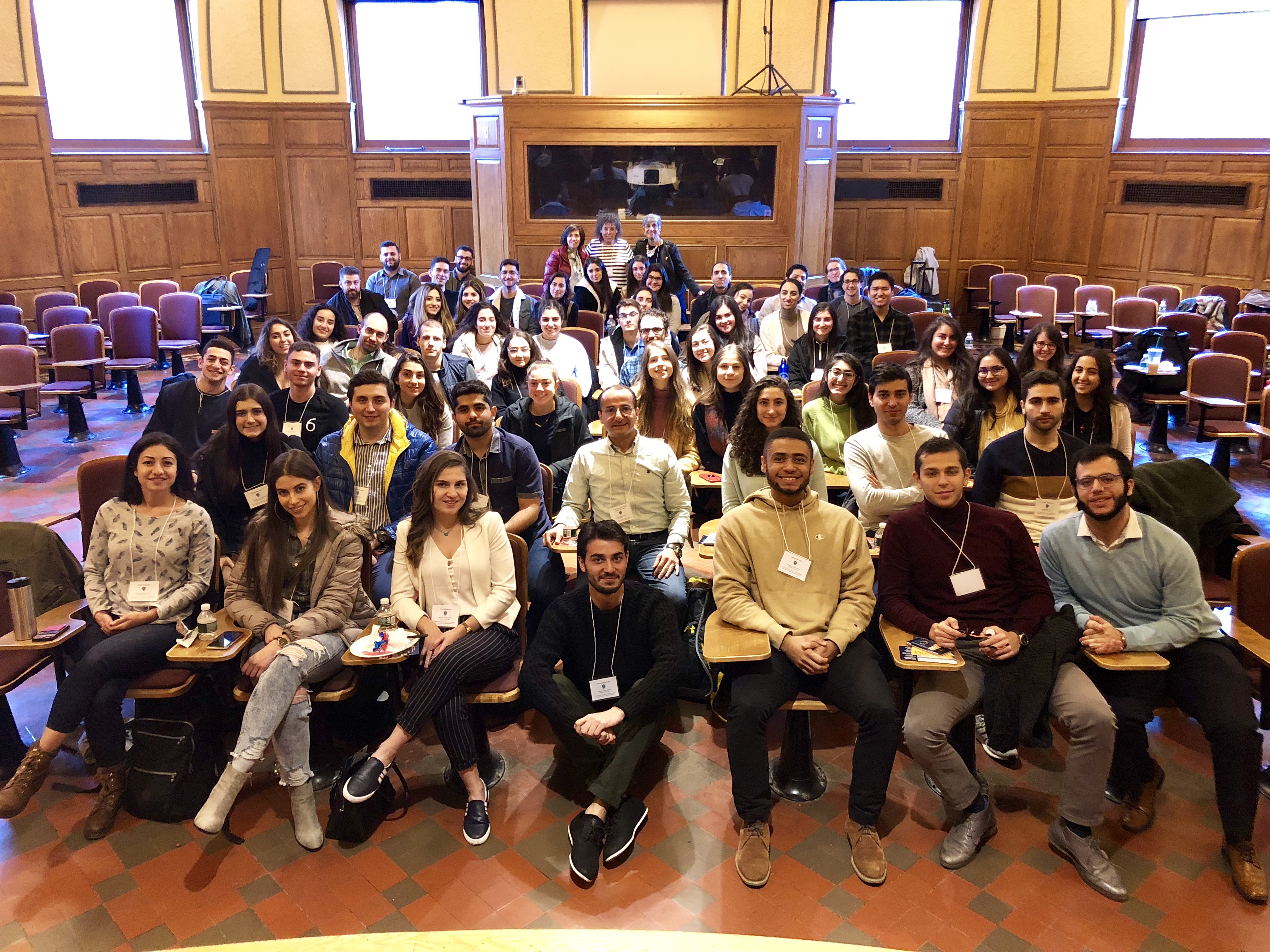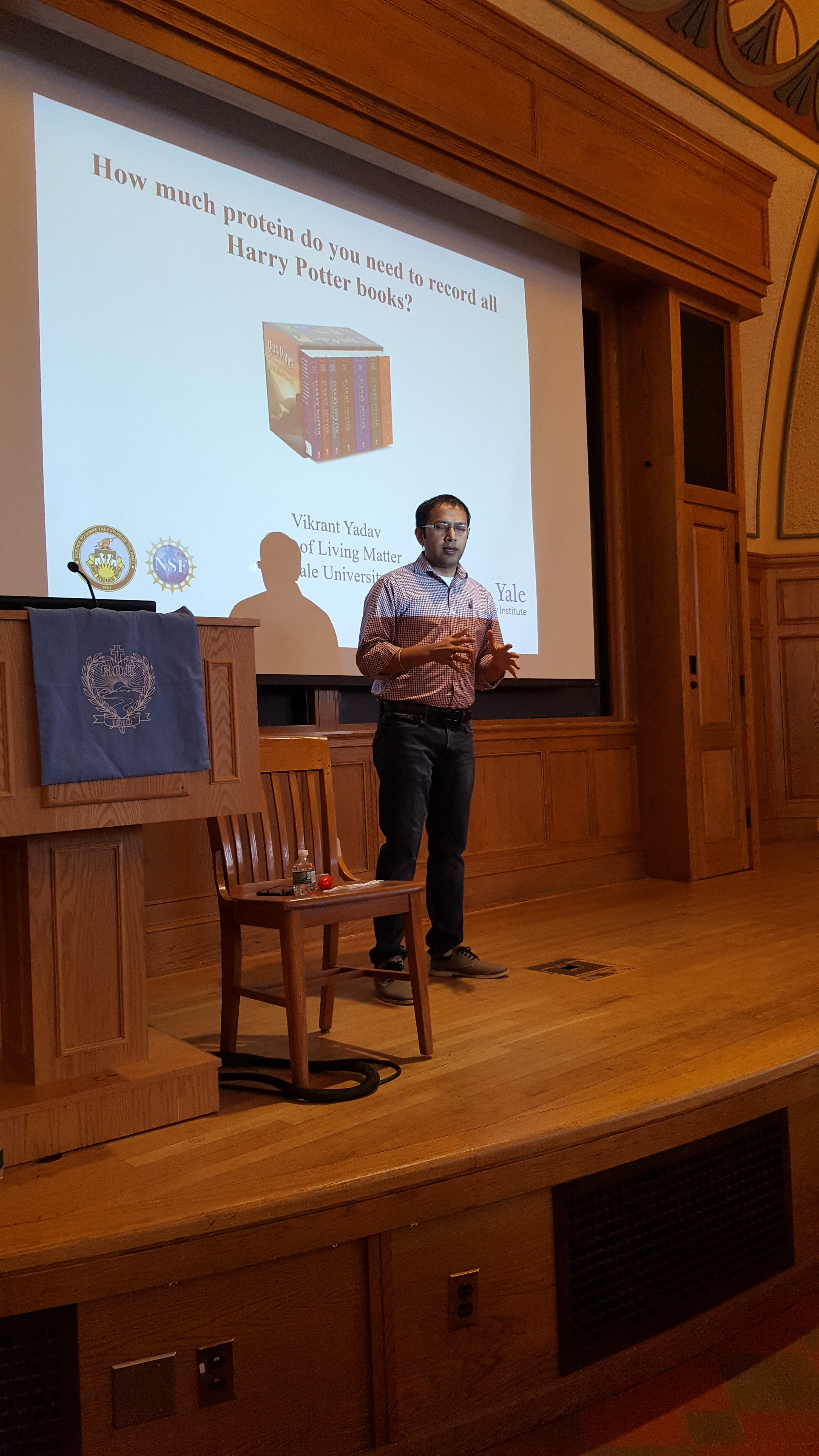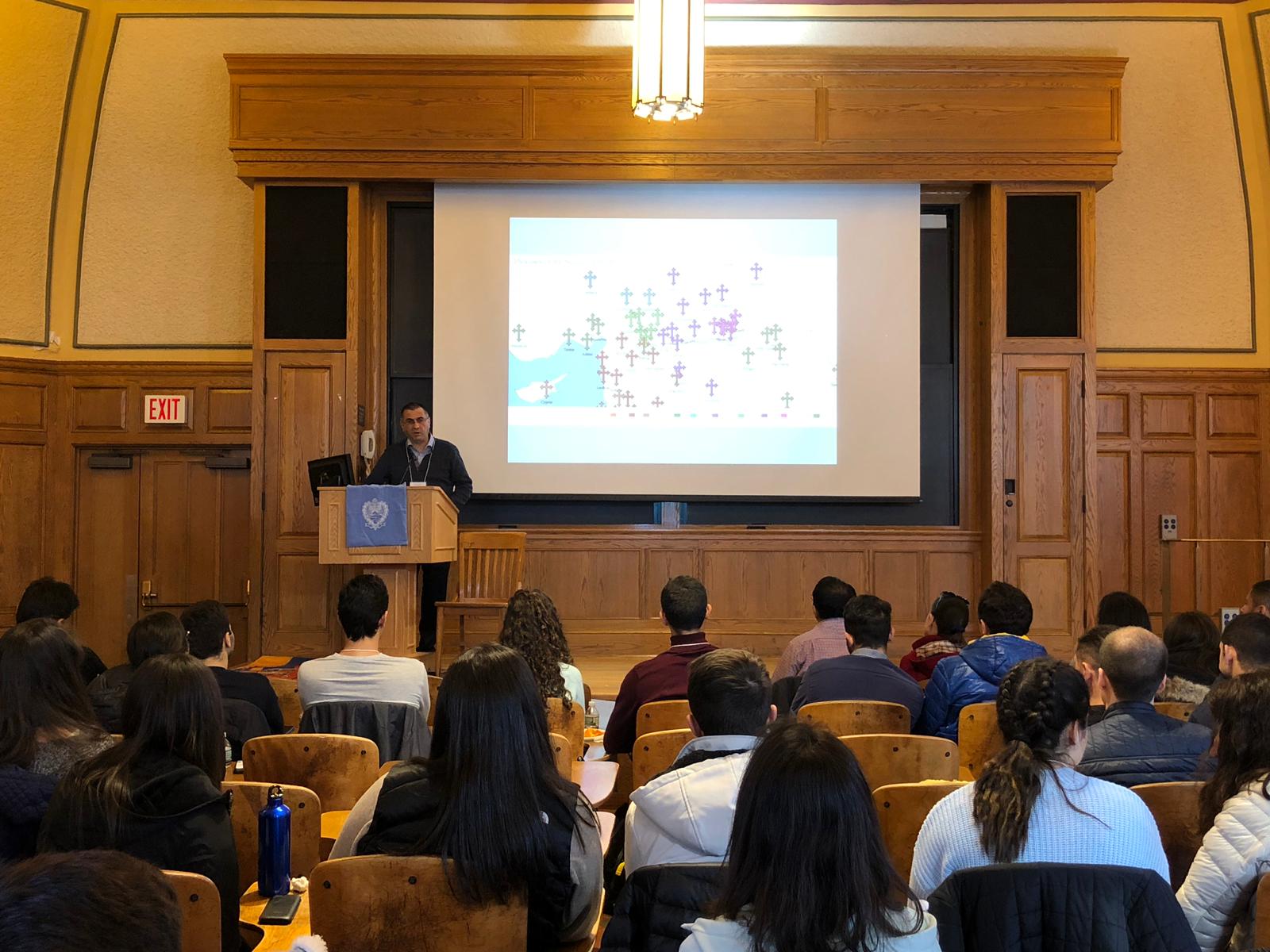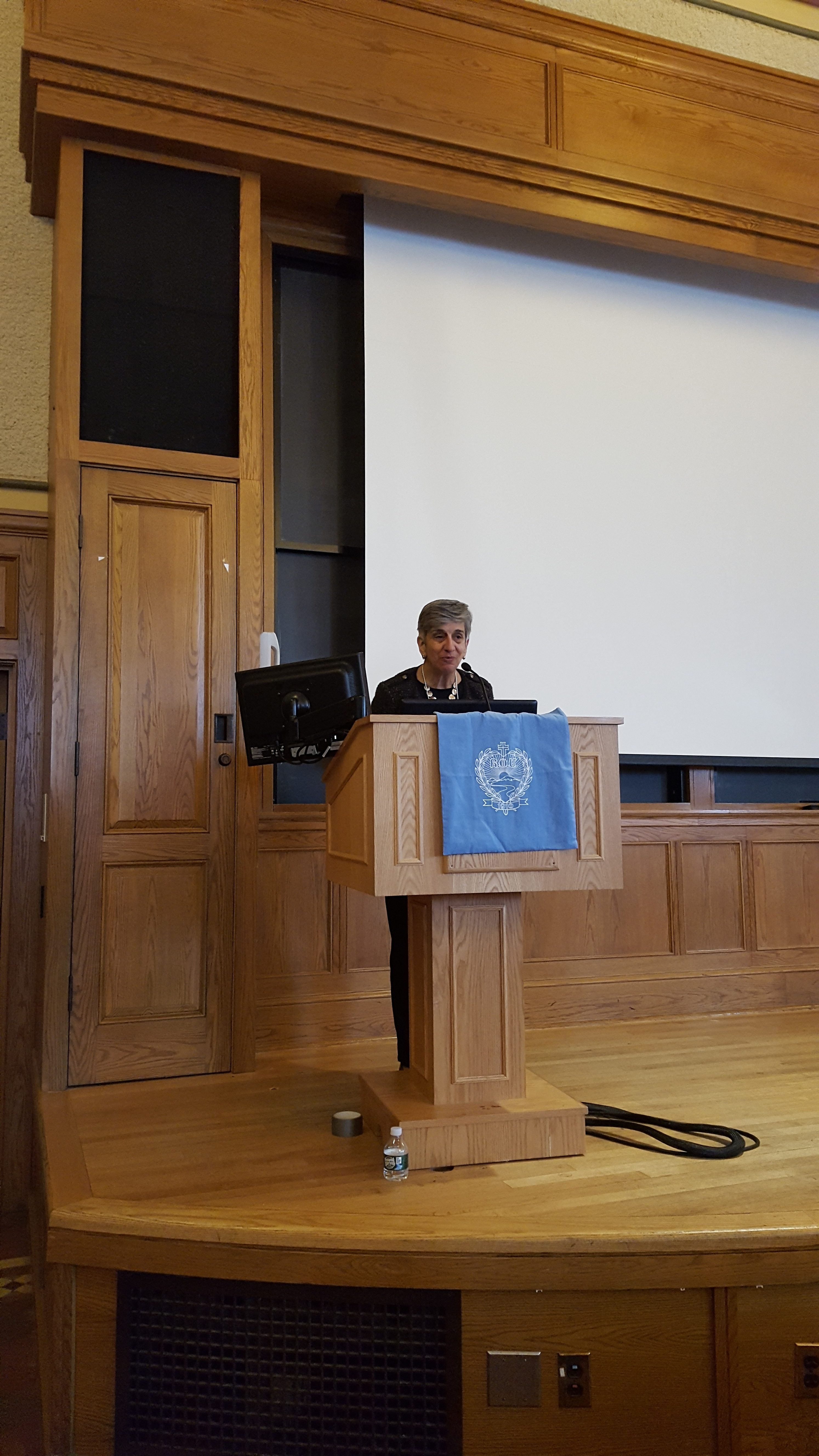
NEW YORK, NY—On the first Saturday of November, scores of college-aged Armenians congregated in the hallowed halls of Yale University for a day-long event filled with lectures and panels on an assortment of topics. The ARS Norian Youth Connect Program (YCP), sponsored and organized by the Armenian Relief Society (ARS) Eastern USA, with a generous endowment from the Norian Fund, has become one of the eastern region’s most popular and versatile draws for young Armenians. What used to be an annual affair is now held twice a year—at Yale University in the fall and Columbia University in the spring, though these locations may change, depending on the interest of students at their respective universities, says Dr. Khatchig Mouradian, Columbia University professor and YCP program director and moderator for the last six years. Under his leadership, the program has expanded in scope, versatility and participation.
For the first time ever, a series of lectures were dedicated to various science topics. Generally, discussions regarding Armenian culture make use of art, literature, politics and history, but topics related to science, technology, engineering and math (STEM) traditionally do not fit into the equation. Some students started expressing a desire to see their majors and career interests coincide with their Armenian identities; YCP heeded the call. The addition was an encouraging reflection on the importance of filling out the evaluation forms that are distributed at the end of the program. (They really do listen!)

The first lecture was by Dr. Vikrant Yadav, a post-doctoral fellow at Yale, who presented some of his groundbreaking research, concerning the storage potential of biological materials, in this case, proteins. Similar to how we store data in our computer hard drives, we can do the same in our “actin cytoskeleton,” he described. The title of Dr. Yadav’s “How much protein do you need to store all 7 Harry Potter books?” was a clever way to introduce an otherwise highly-abstract topic to a broad yet eager audience. That and a few quips about confusing biologists and physicists alike with his “biophysicist” label and how anyone could do their research, so long as they, too, have a $500,000 telescope laying around.
After a granular deep dive into the human cytoskeleton, the next lecture zoomed out to space. The speaker Armen Samurkashian works as an aerospace engineer in the Armenian megalopolis of Los Angeles, but many in the room recalled his humble beginnings as a former YCP participant during his undergraduate days at MIT. Titled “Satellites and Space-Based Infrastructure—Why You Should Care,” his talk provided an engrossing overview of the many ways in which satellites have completely transformed our lives in the last few decades and the importance of being aware of them.

After a bout of shuttles and satellites and space wars, the program landed back down on earth, to (arguably) its core, at least, as it concerns Christians. Dr. Hratch Tchilingirian of Oxford University examined the precarious situation of Christian minorities in Turkey. He began by pointing out the very word “Christian” has its roots in Antioch (renamed Antakya), where being Christian today is met with hostility. Dr. Tchilingirian explained how a series of policies were implemented by the modern Turkish state, formed from the ashes and lootings of genocide that have disadvantaged and disenfranchised Christian communities, which continue into the present day.
After breaking for lunch, a series of rapid-fire presentations followed by the Armenian National Committee of America (ANCA), h-pem Armenian Cultural Platform and Oknooshoon project.
The ANCA has long been a fan favorite at YCP. Programs Director Sipan Ohannesian spoke about the organization’s long-standing efforts in rallying for the Armenian Cause, including the recent passing of H.Res.296, the bipartisan House resolution that recognized the Armenian Genocide earlier this month. Ohannesian talked about the many ways in which students and recent graduates can get involved with ANCA, including the Leo Sarkissian Summer Internship for undergraduates and the Capital Gateway Program for those searching for career positions in the nation’s capital, as well as signing up for their Rapid Responder Program.
I was also fortunate to address the student body as the Assistant Project Manager of h-pem, a new online platform that presents Armenian art and culture in innovative ways, while enhancing cultural interaction among a global network of Armenians. In this horizontally-run initiative, it is vital that young diasporans get involved. They can follow h-pem’s social media pages (Facebook, Instagram and Twitter—all @hpemonline) and sign up as active users on the website, even becoming “ambassadors” in their local communities. However, the platform also serves as a space for budding creatives to pursue their craft(s). “We believe that anyone can submit their own artwork, photographs, videos and articles, because h-pem is not just for your consumption but your active engagement and contribution,” I told the students.
Nairi Krafian is the founder of Oknooshoon, a nonprofit whose aim is to strengthen the human-canine bond in Armenia with the use of animal-assisted therapy and reshaping of local preconceived attitudes on street dogs. The name “Oknooshoon” is a pun on the words “dog” and “help” in Armenian. After running through the organization and its accomplishments, Krafian noted that they are always looking for interns to help out in various areas of operation. She then called on the audience to get involved by spreading the word and following their social media accounts.
The scheduled programming resumed with a discussion of the “Dark Pasts” of Turkey and Japan. Dr. Jennifer Dixon of Villanova University presented some of the findings from her book “Dark Pasts: Changing the State’s Story in Turkey and Japan” which compared the altering narratives by each state (regarding the 1915-1917 Armenian Genocide in Turkey and the 1937-1938 Nanjing Massacre in Japan) from 1950 to 2008. She explained that while both states’ narratives started from similar positions of silencing, relativizing and denial, Japan has apologized for the Nanjing Massacre, while Turkey has continued to deny the Armenian Genocide. Dr. Dixon concluded that “international pressures increase the likelihood of change in official narratives, while domestic considerations determine the content of such change.”
The next presentation was a panel discussion titled “Northern Syria: Community, Culture and Invasion” with Clark University political science professor Dr. Ora Szekely and Dr. Tchilingirian. Dr. Mouradian explained that the inclusion of this panel was brought on last-minute, following the recent events in northern Syria. The professors presented on the harrowing situation in Syria, including a discussion on the recent Turkish invasion of the Kurdish-controlled Rojava region following US withdrawal of support.
Dr. Szekely rewound to 2011 at the breakout of the war in Syria, which, she explained, that many Syrians take issue with labeling as a “civil war,” due to its sectarian connotations. She described the dizzying eight years since, which has ravaged the small country, leaving over 500,000 dead and a staggering 50 percent of its population displaced, either internally or as refugees, with an overwhelming majority (over three million refugees) in Turkey today.
The complicated geopolitical considerations, tensions and conflicts that exacerbate an already depressing situation were further addressed by Dr. Tchilingirian, who touched upon the heterogeneous role of the Kurdish people, noting that the Kurdish perspective(s) on Turkey, Syria and their respective politics is not a monolith. Due to their dispersal and historical persecution in four different countries (Turkey, Syria, Iran and Iraq), some Kurds have internalized their victimhood and project slurs toward other minority groups who are even lower on the totem pole, namely Armenians.
When asked by an audience member who would be the “best winner” among all of the players in this war, Dr. Szekely answered, “All of them have committed egregious war crimes.”
Realizing the need to digest the previous panel’s heavy content, Dr. Mouradian introduced the final speaker’s talk as a true “dessert.” Attorney by day, photographer of the Armenian Highlands by anytime-his-schedule-permits, Matthew Karanian is the ultimate storyteller. His latest book “The Armenian Highland: Western Armenia and the First Republic” was also the name of his talk. Karanian began by sharing the poignant story of Yaşar Kemal, the humble Kurdish man who saved Akhtamar Cathedral from Turkish destruction in the 1950s, using nothing but his wit and profound love and respect for historical legacy—a legacy that did not distinguish between Armenian or Turkish or Kurdish, but “human.” Yaşar Kemal saved Akhtamar, and “he wasn’t even Armenian,” he pronounced.
Karanian then went through a slideshow of some of the images in his book, framing each one with a story or personal anecdote. While he acknowledged that much has been destroyed in Western Armenia, so much still remains and needs to be preserved. “I do not want to have someone look back on my photographs 100 years from now as archival research,” he told the doe-eyed crowd. At this moment, the hall fell silent; one could hear a pin drop. The lesson of the story, as there always is one with Karanian, is that every individual can make a difference, no matter what they are up against. Indeed, that same conviction propels programs like YCP and keeps people coming back every year after year.
After a whirlwind eight hours of enthralling, thought-provoking, transporting discussions, the program officially concluded, but the conversations continued at dinner at Olives and Oil Restaurant.



God Bless You❤️